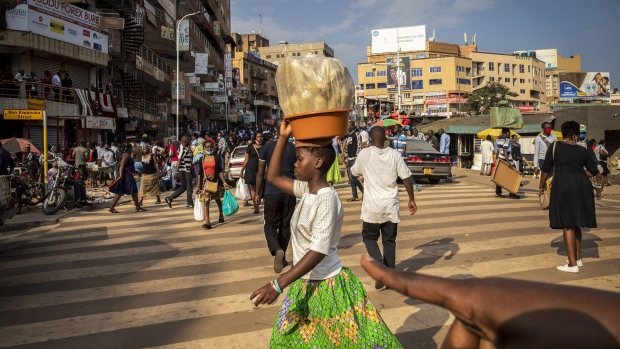Aug 12, 2022
Uganda Hikes Key Interest Rate for Third Consecutive Time to 9%
, Bloomberg News

(Bloomberg) -- The Bank of Uganda raised interest rates for a third straight meeting and signaled its willingness to boost rates further if inflation isn’t reined in.
Policy makers facing the most significant cost pressures in six years lifted the benchmark rate to 9% from 8.5%. That takes the increase in borrowing costs to 250 basis points since June.
“The inflationary pressures are still with us and there’s need to do everything possible to bring inflation back to target of 5%,” Deputy Governor Michael Atingi-Ego said Friday in the capital, Kampala. “Going forward, the MPC considers that the monetary policy stance will have to be tightened even further if inflationary pressures persist to ensure that inflation reverts to its medium-term target of 5%.”
Annual core inflation, which excludes food and energy, exceeded the central bank’s 5% medium-term target for a third successive month in July, accelerating to 6.3% from 5.5% in June. Headline price growth quickened to 7.9% from 6.8%.
Inflation forecasts for this year remain in the 7% and 7.4% range, Atingi-Ego said. Last month, Uganda held the first unscheduled monetary policy committee meeting to be called in Africa since Russia’s invasion of Ukraine upended supply chains and caused commodity prices to surge.
Dim Prospects
Supply shortages and a slide in the shilling spurred by foreign investors exiting risky assets around the globe has fanned inflation. The shilling has depreciated about 6% against the US dollar this year. By 2:15 p.m., the local currency gained 1.1% to 3,771.29 per dollar.
The rate hike means that Uganda has one of highest differentials between inflation and policy rates among more than 50 economies tracked by Bloomberg, making its assets more attractive to investors.
The MPC sees economic growth at 2.5% to 3% this year, rising to 5% and 6% in 2023. That compares with a previous estimate for expansion of 4.5% to 5% in 2022.
“Overall, economic growth prospects have been dimmed further with increasing risks of a global recession, and weaker consumer and business sentiment as high inflation and commodity prices continue to erode households and business incomes and financial conditions tighten,” Atingi-Ego said.
Harvard University’s Growth Lab projects Ugandan gross domestic product will expand 7.48% through 2030 -- the world’s fastest-growing economy in the period.
(Updates with inflation outlook in fifth paragraph)
©2022 Bloomberg L.P.







